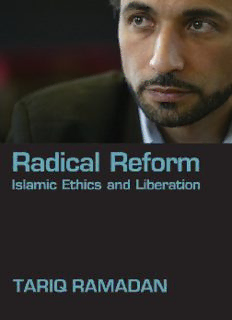
Radical reform : Islamic ethics and liberation PDF
Preview Radical reform : Islamic ethics and liberation
RADICAL REFORM This page intentionally left blank RADICAL REFORM Islamic Ethics and Liberation Tariq Ramadan 1 2009 1 Oxford University Press, Inc., publishes works that further Oxford University’s objective of excellence in research, scholarship, and education. Oxford New York Auckland Cape Town Dar es Salaam Hong Kong Karachi Kuala Lumpur Madrid Melbourne Mexico City Nairobi New Delhi Shanghai Taipei Toronto With offi ces in Argentina Austria Brazil Chile Czech Republic France Greece Guatemala Hungary Italy Japan Poland Portugal Singapore South Korea Switzerland Th ailand Turkey Ukraine Vietnam Copyright © 2009 by Oxford University Press, Inc. Published by Oxford University Press, Inc. 198 Madison Avenue, New York, New York 10016 www.oup.com Oxford is a registered trademark of Oxford University Press All rights reserved. No part of this publication may be reproduced, stored in a retrieval system, or transmitted, in any form or by any means, electronic, mechanical, photocopying, recording, or otherwise, without the prior permission of Oxford University Press. Library of Congress Cataloging-in-Publication Data Ramadan, Tariq. Radical reform : Islamic ethics and liberation / Tariq Ramadan. p. cm. Includes index. ISBN 978-0-19-533171-4 1. Islamic law—Interpretation and construction. 2. Law reform. 3. Ijtihad (Islamic law). 4. Islamic ethics. I. Title. KBP470.R36 2009 340.5'9—dc22 2008026901 1 3 5 7 9 8 6 4 2 Printed in the United States of America on acid-free paper To you, Who through your presence of heart and mind Have enabled me to go forward and to remain standing And have off ered me energy and hope This page intentionally left blank Contents Introduction (cid:1) 1 I ABOUT REFORM 1 Th e Concept of “Reform” (cid:1) 11 2 What Reform Do We Mean? (cid:1) 26 II CLASSICAL APPROACHES OF THE FUNDAMENTALS OF LAW AND JURISPRUDENCE (USÛL AL-FIQH ) 3 Imam ash-Shâfi ’î: Th e Deductive Approach (cid:1) 41 4 Th e Hanafî School: Th e Inductive Approach (cid:1) 49 5 Th e School of Maqâsid: Th e Higher Objectives of Law (cid:1) 59 6 A Synthesis (cid:1) 77 viii (cid:1) CONTENTS III FOR A NEW GEOGRAPHY OF THE SOURCES OF LAW AND JURISPRUDENCE (USÛL AL-FIQH ) 7 Determining the Sources of Islamic Law and Jurisprudence (cid:1) 85 8 Th e Context (al-Wâqi’) as a Source of Law (cid:1) 101 9 Th e Growing Complexity of the Real (cid:1) 113 10 Elaborating an Applied Islamic Ethics (cid:1) 126 IV CASE STUDIES 11 Islamic Ethics and Medical Sciences (cid:1) 159 12 Culture and the Arts (cid:1) 183 13 Women: Traditions and Liberation (cid:1) 207 14 Ecology and Economy (cid:1) 233 15 Society, Education, and Power (cid:1) 259 16 Ethics and Universals (cid:1) 293 CONTENTS (cid:1) ix Conclusion (cid:1) 315 Acknowledgments (cid:1) 321 Notes (cid:1) 323 Glossary (cid:1) 359 Index (cid:1) 365
Description: